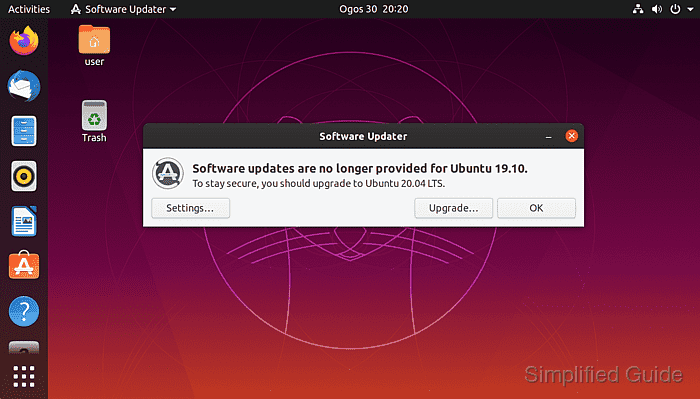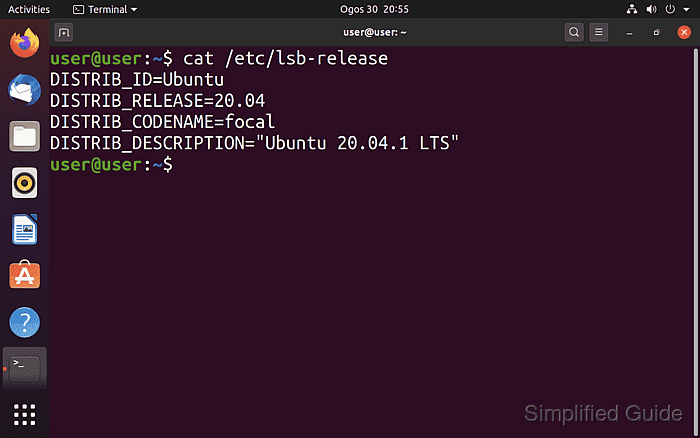Ubuntu releases new versions every six months, usually in April and October. Each iteration follows a format of year.month and applies to variants like Kubuntu and Xubuntu. These updates incorporate critical security patches, performance improvements, and new features.

Manual upgrades are particularly useful when automatic updates are disabled or malfunctioning. They offer deeper control over the upgrade process, ensuring every aspect aligns with administrator requirements. The APT package management system in Ubuntu allows for streamlined upgrades and seamless transitions to newer releases.
Comprehensive backups are essential before upgrading any system. Interruptions or version conflicts can lead to critical errors, so it is recommended to validate both disk space and resource availability in advance. Keeping an eye on the process reduces unexpected issues and helps maintain a stable environment.
Steps to upgrade Ubuntu or Kubuntu to the latest version:
- Back up your system and data.
Make sure that you have a backup of both data and configuration of the system you're upgrading. System upgrade is not 100% reliable and could result in conflicts and a malfunctioning system.
- Open the terminal on your Ubuntu system.
- Update the package list for apt.
$ sudo apt update [sudo] password for user: Hit:1 http://archive.ubuntu.com/ubuntu eoan InRelease Hit:2 http://archive.ubuntu.com/ubuntu eoan-updates InRelease Hit:3 http://archive.ubuntu.com/ubuntu eoan-backports InRelease Hit:4 http://archive.ubuntu.com/ubuntu eoan-security InRelease Reading package lists... Done Building dependency tree Reading state information... Done All packages are up to date.
- Upgrade the installed packages to the latest available versions.
$ sudo apt dist-upgrade --assume-yes Reading package lists... Done Building dependency tree Reading state information... Done Calculating upgrade... Done 0 upgraded, 0 newly installed, 0 to remove and 0 not upgraded.
- Check for the availability of a new Ubuntu version.
$ do-release-upgrade --check Checking for a new Ubuntu release Your Ubuntu release is not supported anymore. For upgrade information, please visit: http://www.ubuntu.com/releaseendoflife New release '20.04 LTS' available. Run 'do-release-upgrade' to upgrade to it.
- Initiate the release upgrade using do-release-upgrade.
$ sudo do-release-upgrade Checking for a new Ubuntu release Your Ubuntu release is not supported anymore. For upgrade information, please visit: http://www.ubuntu.com/releaseendoflife Get:1 Upgrade tool signature [1,554 B] Get:2 Upgrade tool [1,348 kB] Fetched 1,350 kB in 0s (0 B/s) authenticate 'focal.tar.gz' against 'focal.tar.gz.gpg' extracting 'focal.tar.gz' Reading cache Checking package manager Reading package lists... Done Building dependency tree Reading state information... Done Hit http://archive.ubuntu.com/ubuntu eoan InRelease Hit http://archive.ubuntu.com/ubuntu eoan-updates InRelease Hit http://archive.ubuntu.com/ubuntu eoan-backports InRelease Hit http://archive.ubuntu.com/ubuntu eoan-security InRelease Fetched 0 B in 0s (0 B/s) Reading package lists... Done Building dependency tree Reading state information... Done Checking for installed snaps Calculating snap size requirements Updating repository information Get:1 http://archive.ubuntu.com/ubuntu focal InRelease [265 kB] Get:2 http://archive.ubuntu.com/ubuntu focal-updates InRelease [111 kB] Get:3 http://archive.ubuntu.com/ubuntu focal-backports InRelease [98.3 kB] Get:4 http://archive.ubuntu.com/ubuntu focal-security InRelease [107 kB] ##### snipped Get:85 http://archive.ubuntu.com/ubuntu focal-security/multiverse amd64 c-n-f Metadata [116 B] Fetched 39.7 MB in 6s (3,288 kB/s) Checking package manager Reading package lists... Done Building dependency tree Reading state information... Done Calculating the changes Calculating the changes Do you want to start the upgrade? 2 packages are going to be removed. 111 new packages are going to be installed. 1232 packages are going to be upgraded. You have to download a total of 951 M. This download will take about 4 minutes with your connection.
- Press [y] and [ENTER] to accept and continue.
Installing the upgrade can take several hours. Once the download has finished, the process cannot be canceled. Continue [yN] Details [d]
- Press [ENTER] to continue .
Lock screen disabled Your lock screen has been disabled and will remain disabled until you reboot. To continue please press [ENTER] Inhibiting until Ctrl+C is pressed...
- Wait for the upgraded packages to finish downloading.
Fetching Get:1 http://archive.ubuntu.com/ubuntu focal/main amd64 gcc-10-base amd64 10-20200411-0ubuntu1 [19.0 kB] Get:2 http://archive.ubuntu.com/ubuntu focal/main amd64 libgcc-s1 amd64 10-20200411-0ubuntu1 [41.6 kB] Get:3 http://archive.ubuntu.com/ubuntu focal/main amd64 libcrypt1 amd64 1:4.4.10-10ubuntu4 [78.2 kB] Get:4 http://archive.ubuntu.com/ubuntu focal/main amd64 libc6 amd64 2.31-0ubuntu9 [2,713 kB] Get:5 http://archive.ubuntu.com/ubuntu focal/main amd64 libc-bin amd64 2.31-0ubuntu9 [636 kB] Get:6 http://archive.ubuntu.com/ubuntu focal/main amd64 locales all 2.31-0ubuntu9 [3,870 kB] Get:7 http://archive.ubuntu.com/ubuntu focal/main amd64 libc6-dbg amd64 2.31-0ubuntu9 [5,671 kB] Get:8 http://archive.ubuntu.com/ubuntu focal/main amd64 libc-dev-bin amd64 2.31-0ubuntu9 [71.8 kB] Get:9 http://archive.ubuntu.com/ubuntu focal/main amd64 libc6-dev amd64 2.31-0ubuntu9 [2,520 kB] Get:10 http://archive.ubuntu.com/ubuntu focal/main amd64 libcrypt-dev amd64 1:4.4.10-10ubuntu4 [104 kB] Get:11 http://archive.ubuntu.com/ubuntu focal-updates/main amd64 linux-libc-dev amd64 5.4.0-42.46 [1,109 kB]
- Wait for the upgraded packages to finish installing.
Upgrading Fetched 0 B in 0s (0 B/s) MarkInstall libc6:amd64 < 2.30-0ubuntu2.2 -> 2.31-0ubuntu9 @ii umU Ib > FU=1 Installing libgcc-s1 as Depends of libc6 MarkInstall libgcc-s1:amd64 < none -> 10-20200411-0ubuntu1 @un uN Ib > FU=0 Installing gcc-10-base as Depends of libgcc-s1 MarkInstall gcc-10-base:amd64 < none -> 10-20200411-0ubuntu1 @un uN > FU=0 Installing libcrypt1 as Depends of libc6 MarkInstall libcrypt1:amd64 < none -> 1:4.4.10-10ubuntu4 @un uN > FU=0 MarkInstall locales:amd64 < 2.30-0ubuntu2.2 -> 2.31-0ubuntu9 @ii umU Ib > FU=0 Installing libc-bin as Depends of locales MarkInstall libc-bin:amd64 < 2.30-0ubuntu2.2 -> 2.31-0ubuntu9 @ii umU > FU=0 Starting pkgProblemResolver with broken count: 1 Starting 2 pkgProblemResolver with broken count: 1 Investigating (0) libc6-dev:amd64 < 2.30-0ubuntu2.2 -> 2.31-0ubuntu9 @ii umU Ib > Broken libc6-dev:amd64 Depends on libcrypt-dev:amd64 < none | 1:4.4.10-10ubuntu4 @un uH > Considering libcrypt-dev:amd64 1 as a solution to libc6-dev:amd64 11 MarkKeep libc6-dev:amd64 < 2.30-0ubuntu2.2 -> 2.31-0ubuntu9 @ii umU Ib > FU=0 Re-Instated libcrypt-dev:amd64 Re-Instated libc6-dev:amd64 Done Upgrading Fetched 0 B in 0s (0 B/s) Preconfiguring packages ... Preconfiguring packages ... Preconfiguring packages ... Preconfiguring packages ... Selecting previously unselected package gcc-10-base:amd64. (Reading database ... 181113 files and directories currently installed.) Preparing to unpack .../gcc-10-base_10-20200411-0ubuntu1_amd64.deb ... Unpacking gcc-10-base:amd64 (10-20200411-0ubuntu1) ... Setting up gcc-10-base:amd64 (10-20200411-0ubuntu1) ... Progress: [ 7%] Selecting previously unselected package libgcc-s1:amd64. (Reading database ... 181118 files and directories currently installed.) Preparing to unpack .../libgcc-s1_10-20200411-0ubuntu1_amd64.deb ... Unpacking libgcc-s1:amd64 (10-20200411-0ubuntu1) ... Replacing files in old package libgcc1:amd64 (1:9.2.1-9ubuntu2) ... ##### snipped - Press [y] and [ENTER] to confirm removing of obsolete packages.
Searching for obsolete software Reading state information... Done Remove obsolete packages? 71 packages are going to be removed. Continue [yN] Details [d]
- Press [y] and [ENTER] to reboot your system.
System upgrade is complete. Restart required To finish the upgrade, a restart is required. If you select 'y' the system will be restarted. Continue [yN]
- Login and start using your updated Ubuntu or Kubuntu version.

This guide is tested on Ubuntu:
| Version | Code Name |
|---|---|
| 22.04 LTS | Jammy Jellyfish |
| 23.10 | Mantic Minotaur |
| 24.04 LTS | Noble Numbat |

Mohd Shakir Zakaria is a cloud architect with deep roots in software development and open-source advocacy. Certified in AWS, Red Hat, VMware, ITIL, and Linux, he specializes in designing and managing robust cloud and on-premises infrastructures.
